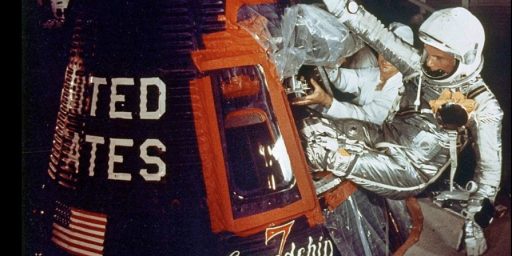Intelligent Design Q&A
Branden Fitelson asks some interesting questions about Intelligent Design (ID). The questions are,
- (Q1) Should ID be taught in public schools?
- (Q1.1) Should ID be included in the science curriculum of public schools?
- (Q1.1) Should ID be included in some part of the public school curriculum?
- (Q.2) What is ID? In other words, is ID a scientific theory, a religious doctrine, an epistemological stance, something else altogether?
- (Q.3) Is there (any) phenomena (scientific evidence) that Evolutionary Theory (ET) is unable to adequately predict and/or explain?
- (Q.4) Is there (any) scientific evidence that favors ID over ET?
- (Q.5) Given our total evidence should we reject ET in favor of ID?
His answers are,
- (Q1) Yes.
- (Q1.1) No.
- (Q1.1) Yes, in a philosophy class for example.
- (Q.2) Definitely not science.
- (Q.3) Fitelson grants this for the sake of argument.
- (Q.4) No.
- (Q.5) No.
Many ID supporters will likely be upset with the answers to (Q.2), (Q.4), and (Q.5). One thing many proponents of ID (IDists) like to claim that ID is science, but Fitelson argues why ID is not science, and despite the evidence (by assumption) that cannot be explained by ET, that is insufficient for ID to be favored over ET.
To demonstrate all of this Fitelson goes through an example using Newtonian celestial mechanics and Eintsteinian celestial mechanics. The basic point here is that the Newtonian model could not explain Mercury’s orbit and hence it was a “theory in crisis” (to use the verbiage of IDists). However, the Newtonian model was not rejected due to this deficiency. The Newtonian model was only rejected when a new theory came along and did two things:
- Explain why the Newtonian Model worked so well for most aspects of celestial mechanics.
- Explained Mercury’s orbit.
Only at this juncture was the new model favored over the previous model. Fitelson even makes this concept very precise with the following notation,
- T1: The Newtonian Model
- T2: The Einsteinian Model
- E: Mercury’s orbit.
From this the necessary condition for favoring T2 over T1 is,
That, is the likelihood of observing the evidence under the Einsteinian model is greater than under the Newtonian model.
But this is precisely where the IDists run into trouble. There is never, by anybody in the ID camp, any attempt to evaluate Pr(E*|ID); where E* is that biological evidence that ET cannot explain. Instead, all that is done is to argue that Pr(E*|ET) is so small that we should reject it without knowing anything at all about its replacement. As Fitelson points out this has not been how science has worked throughout history. “What happened with Newton and Einstein also happened with Newton and Keppler, and Keppler and Conpernicus, etc.” That is, science is contrastive in that the efficacy of one theory is contrasted to the efficacy of the competing theories.
I’ve argued that the problem stems from the fact that many IDists will not discuss anything about their hypothesis at all. For example: How was the design implmented? This one seems to be crucial in being able to evaluate Pr(E*|ID). To make this concrete consider that there are two versions of the ID viewpoint. The first is one of biochemical design of things like the E. coli flagellum. The second is that the universe is fine tuned–i.e. designed to be life friendly. A designer who designed a fine tuned universe does not necessarily have to be a designer who also engaged in biochemcial design. That is, suppose we partition the ID hypothesis into ID1 for biochemical design and ID2 for anthropic design. Seems to me it would be hard to make the case that
if E*is a fine tuned universe. In fact, it would seem reasonable to conclude,
And if we should conclude that the two likelihoods are indeed equal, why? In answering this question there is a deafening wall of silence from the IDists. Similarly if E* is the E. coli flagellum. If the designer is simply a being that has created a life friendly universe, why assume that this designer then engaged in biochemical engineering as well?
On top of this, there is the issue of the supernatural. One could read ID as being defined so that the design relies on natural processes. If this is the case, the ID is equivalent to ET from a likelihood standpoint and the ID hypothesis is not in competition with the ET hypothesis: they are in fact one in the same from this view. However, this is not the view of very many prominent IDists (at least those associated with the Discovery Institute). Clearly, these IDists must have something else in mind and that can only be design that transcends/circumvents natural process: that is the supernatural. This too, makes the classification of ID as science very problematic.
Take these two points together and the only conclusion is the obvious one: ID is not science. As such, teaching it in a science course is simply a bad idea. It would be like teaching creative writing or gym in a science course. Teaching ID in a philosophy course that discusses things like basic logic, critical thinking, philosophy of science, etc. could be very helpful.



of course the ID is not equivalent to ET from a likihood standpoint.’nuff said.
I’ve been pushing the same thing for years. ID can be useful in elucidating the boundaries of science, for instance. Alternately, it serves as a good intro to basic philosophy of religion.
ooooo Steve! You are sooo smart!
Maybe you should be a scientist priest. Oh wait-a priest scientist. Or….
Well, who the hell knows! Maybe God…